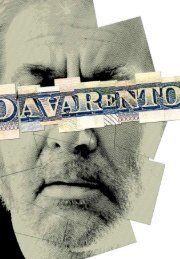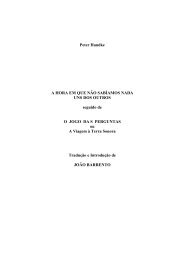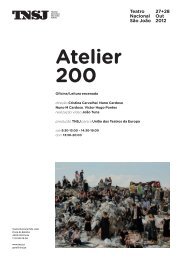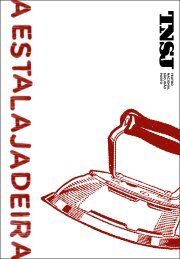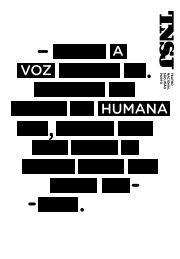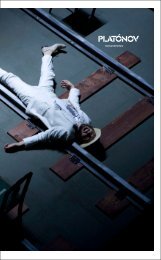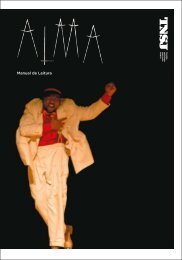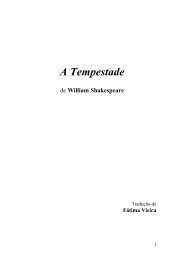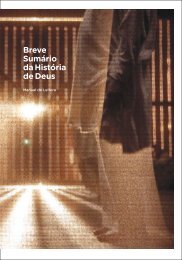Programa Odisseia - Teatro Nacional São João no Porto
Programa Odisseia - Teatro Nacional São João no Porto
Programa Odisseia - Teatro Nacional São João no Porto
You also want an ePaper? Increase the reach of your titles
YUMPU automatically turns print PDFs into web optimized ePapers that Google loves.
diE KLAgE dER<br />
KAiSERiN<br />
O Lamento da imperatriz/<br />
The Complaint of an Empress<br />
realização/directed by pina Bausch (1989)<br />
duração/running time [1:43]<br />
CAFÉ MüLLER<br />
realização/directed by pina Bausch (1985)<br />
duração/running time [55’]<br />
O ciclo de cinema dedicado a Pina Bausch<br />
abre com dois filmes realizados pela própria<br />
coreógrafa alemã que, ao inventar uma <strong>no</strong>va<br />
forma de dançar, criou também um género<br />
teatral inédito: o teatro ‑dança. Mas Die Klage der<br />
Kaiserin e Café Müller são objectos de carácter<br />
diverso: se em Café Müller Pina Bausch reproduz<br />
em vídeo aquela que é, provavelmente, a mais<br />
autobiográfica das suas coreografias – uma<br />
peça que reconstitui uma memória pessoal da<br />
experiência do pós ‑guerra e do café do pai onde<br />
passava longas horas –, Die Klage der Kaiserin faz<br />
de diferentes pontos de Wuppertal (a cidade em<br />
que Pina Bausch residia com a sua companhia)<br />
o seu palco: bosques, o célebre mo<strong>no</strong>carril<br />
suspenso, uma loja de tapetes, uma estufa, o<br />
centro da cidade… Se a mudança das estações<br />
pontua a organização do filme, a sua estrutura<br />
interna reflecte o peculiar método de trabalho<br />
desenvolvido pela coreógrafa na primeira metade<br />
da década de 1970. •<br />
The cycle dedicated to Pina Bausch opens with<br />
two films directed by the German choreographer<br />
herself who, in inventing a new form of dance,<br />
also created a singular theatrical genre: dance<br />
theatre. But Die Klage der Kaiserin and Café Müller<br />
have very different characteristics. In Café Müller<br />
Pina Bausch reproduces on film what is probably<br />
the most autobiographical of her choreographies,<br />
a piece that reconstructs a personal memory of<br />
the post ‑war period and her father’s café, where<br />
she spent many hours. In Die Klage der Kaiserin<br />
she makes the city of Wuppertal (where she<br />
resided with her company) her stage: woods,<br />
the famous suspended railway, a carpet shop,<br />
a greenhouse, the city centre… The changing<br />
of the seasons punctuates the organisation of<br />
the film, while its internal structure reflects<br />
the particular way of working developed by the<br />
choreographer in the first half of the 1970s. •<br />
Auditório de Serralves<br />
7 Mai/May 2011<br />
sáb/sat 16:00<br />
dAMEN UNd<br />
HERREN AB 65<br />
Senhoras e Senhores com Mais de 65/<br />
Ladies and gentlemen over 65<br />
realização/directed by Lilo Mangelsdorf (2002)<br />
duração/running time [1:10]<br />
SONHOS dE dANçA<br />
dancing dreams<br />
Antestreia nacional/National pre ‑premiere<br />
realização/directed by<br />
Anne Linsel, Rainer Hoffman (2010)<br />
duração/running time [1:29]<br />
Filme legendado em português/<br />
With Portuguese subtitles<br />
Documentário exaltante e vitalista, Sonhos de<br />
Dança segue um a<strong>no</strong> de ensaios de Kontakthof,<br />
peça de 1978 recriada com jovens de catorze<br />
a<strong>no</strong>s de Wuppertal. Para além de testemunhar<br />
o processo de maturação desta experiência<br />
com amadores, o documentário de Anne Linsel<br />
e Rainer Hoffman constitui uma sensível<br />
sondagem dos adolescentes de hoje, dos seus<br />
medos e desejos, matéria ‑prima que a coreógrafa<br />
trabalhou na sala de ensaios para recriar um<br />
clássico sobre as relações humanas. Sonhos de<br />
Dança formará um precioso díptico com Senhoras<br />
e Senhoras com Mais de 65 a<strong>no</strong>s, documentário<br />
sobre a recriação, alguns a<strong>no</strong>s antes, da mesma<br />
peça com adultos seniores, um filme que<br />
outorgou a Lilo Mangelsdorf o prémio de Melhor<br />
Documentário da Associação Alemã de Críticos de<br />
Cinema. •<br />
An exalting and lively documentary, Dancing<br />
Dreams follows a year of rehearsals for<br />
Kontakthof, a piece from 1978 recreated with a<br />
group of fourteen ‑year ‑olds from Wuppertal.<br />
As well as a testimony of how this experience<br />
with amateurs reached its maturity, Anne<br />
Linsel and Rainer Hoffman’s documentary is a<br />
sensitive survey of today’s adolescents, their<br />
fears and wishes. This is the raw material the<br />
choreographer worked with in the rehearsal<br />
studio to recreate a classic about human<br />
emotions. Dancing Dreams forms a precious<br />
diptych with Ladies and Gentlemen over 65, a<br />
documentary about the recreation of the same<br />
piece some years before with seniors, which<br />
earned Lilo Mangelsdorf the German Cinema<br />
Critics’ Association prize for Best Documentary. •<br />
Auditório de Serralves<br />
8 Mai/May 2011<br />
dom/sun 16:00<br />
piNA<br />
Antestreia nacional/National pre ‑premiere<br />
realização/directed by Wim Wenders (2011)<br />
duração/running time [1:46]<br />
Filme 3D/3‑D film<br />
Filme legendado em português/<br />
With Portuguese subtitles<br />
Uma entusiástica ovação de pé acolheu, <strong>no</strong><br />
passado mês de Março, <strong>no</strong> Théâtre de la Ville, a<br />
antestreia em França de Pina de Wim Wenders,<br />
o primeiro filme em 3D na cinematografia do<br />
realizador alemão e também <strong>no</strong> domínio da<br />
dança. Já <strong>no</strong> dia 8 de Abril, Pina foi distinguido<br />
com o prémio Lola – o mais importante galardão<br />
do cinema alemão – na categoria de Melhor<br />
Documentário. A revista Mouvement descreve ‑o<br />
como “um verdadeiro grande filme” onde se<br />
“adivinha e respira a todo o momento o olhar e<br />
o sorriso de Pina Bausch, com algumas imagens<br />
de arquivo, raras e irradiantes”. As palavras da<br />
coreógrafa atravessam, em filigrana, este filme<br />
de Wim para Pina: “Dancem, dancem… Senão<br />
estamos perdidos”. •<br />
The premiere of Wim Wenders’s Pina last March<br />
at Théâtre de la Ville in France was received with<br />
an enthusiastic standing ovation. This is the<br />
German director’s first 3D film as well as the first<br />
3D film about dance. On April 8th the film was<br />
distinguished with a Lola – the most important<br />
award in German cinema – in the category of<br />
Best Documentary. The magazine Mouvement<br />
describes it as a “truly great film” where “in every<br />
moment we feel and breathe Pina Bausch’s gaze<br />
and smile, with some archival footage, rare and<br />
radiant”. Her words are constantly present, like<br />
a watermark, in what is clearly a film from Wim to<br />
Pina: “Dance, dance… Otherwise, we are lost”. •<br />
UCi Arrábida<br />
8 Mai/May 2011<br />
dom/sun 21:30<br />
<strong>Odisseia</strong>: <strong>Teatro</strong> do Mundo<br />
UN JOUR, piNA<br />
A dEMANdÉ<br />
35<br />
realização/directed by Chantal Akerman (1983)<br />
duração/running time [58’]<br />
Em Un jour, Pina a demandé – filme realizado<br />
<strong>no</strong> início da década de 1980 para uma série<br />
televisiva dedicada às grandes referências da<br />
dança moderna –, Chantal Akerman acompanha<br />
o trabalho de Pina Bausch de cidade em cidade<br />
e de festival em festival, captando os momentos<br />
mais intensos, filmando quase sobre o corpo dos<br />
bailari<strong>no</strong>s. Sem nunca resvalar para a reportagem<br />
ou o documentário jornalístico, a cineasta belga<br />
devolve ‑<strong>no</strong>s, pelo seu olhar, a violência passional<br />
e política a que as coreografias de Pina Bausch<br />
dão expressão. •<br />
In Un jour, Pina a demandé – a film produced in<br />
the 1980s for a television series dedicated to<br />
the great references of modern dance – Chantal<br />
Akerman follows Pina Bausch’s work from city to<br />
city and from festival to festival, capturing the<br />
most intense moments, filming almost on top of<br />
the dancers’ bodies. Without ever lapsing into a<br />
style of reporting or journalistic documentary,<br />
the Belgian filmmaker shares, through her lens,<br />
the passionate and political violence expressed in<br />
Pina Bausch’s choreographies. •<br />
Auditório de Serralves<br />
9 Mai/May 2011<br />
seg/mon 21:30



